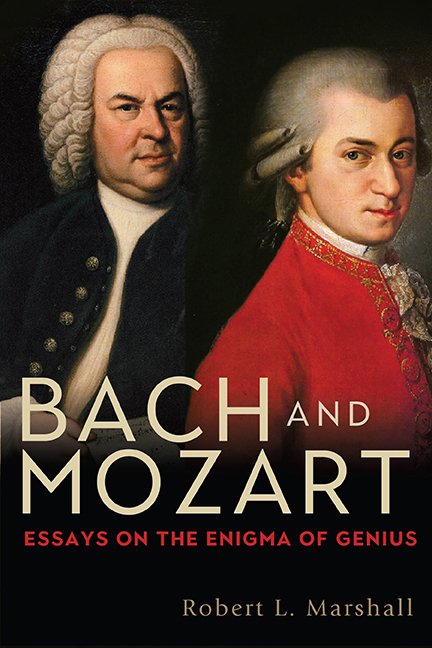Book contents
- Frontmatter
- Dedication
- Epigraph
- Contents
- List of Figures
- Preface
- List of Abbreviations
- Prologue. The Century of Bach and Mozart as a Music-Historical Epoch: A Different Argument for the Proposition
- 1 Young Man Bach: Toward a Twenty-First-Century Bach Biography
- 2 The Notebooks for Wilhelm Friedemann and Anna Magdalena Bach: Some Biographical Lessons
- 3 Bach and Luther
- 4 Redeeming the St. John Passion–and J. S. Bach
- 5 Bach's Keyboard Music
- 6 The Minimalist and Traditionalist Approaches to Performing Bach's Choral Music: Some Further Thoughts
- 7 Truth and Beauty: J. S. Bach at the Crossroads of Cultural History
- 8 Bach at Mid-Life: The Christmas Oratorio and the Search for New Paths
- 9 Bach at the Boundaries of Music History: Preliminary Reflections on the B-Minor Mass and the Late-Style Paradigm
- 10 Father and Sons: Confronting a Uniquely Daunting Paternal Legacy
- 11 Johann Christian Bach and Eros
- 12 Bach and Mozart: Styles of Musical Genius
- 13 Mozart and Amadeus
- 14 Bach and Mozart's Artistic Maturity
- 15 Mozart's Unfinished: Some Lessons of the Fragments
- Epilogue (ossia Postmortem). Had Mozart Lived Longer: Some Cautious (and Incautious) Speculations
- Notes
- Works Cited
- Index
- Miscellaneous Endmatter
- Eastman Studies in Music
14 - Bach and Mozart's Artistic Maturity
Published online by Cambridge University Press: 29 March 2020
- Frontmatter
- Dedication
- Epigraph
- Contents
- List of Figures
- Preface
- List of Abbreviations
- Prologue. The Century of Bach and Mozart as a Music-Historical Epoch: A Different Argument for the Proposition
- 1 Young Man Bach: Toward a Twenty-First-Century Bach Biography
- 2 The Notebooks for Wilhelm Friedemann and Anna Magdalena Bach: Some Biographical Lessons
- 3 Bach and Luther
- 4 Redeeming the St. John Passion–and J. S. Bach
- 5 Bach's Keyboard Music
- 6 The Minimalist and Traditionalist Approaches to Performing Bach's Choral Music: Some Further Thoughts
- 7 Truth and Beauty: J. S. Bach at the Crossroads of Cultural History
- 8 Bach at Mid-Life: The Christmas Oratorio and the Search for New Paths
- 9 Bach at the Boundaries of Music History: Preliminary Reflections on the B-Minor Mass and the Late-Style Paradigm
- 10 Father and Sons: Confronting a Uniquely Daunting Paternal Legacy
- 11 Johann Christian Bach and Eros
- 12 Bach and Mozart: Styles of Musical Genius
- 13 Mozart and Amadeus
- 14 Bach and Mozart's Artistic Maturity
- 15 Mozart's Unfinished: Some Lessons of the Fragments
- Epilogue (ossia Postmortem). Had Mozart Lived Longer: Some Cautious (and Incautious) Speculations
- Notes
- Works Cited
- Index
- Miscellaneous Endmatter
- Eastman Studies in Music
Summary
In the annals of musicological writing few questions have been rehearsed so often, or for so long, as that of Mozart's relationship to Bach and the significance of that rela-tionship for subsequent music history. The traditional, and still predominant, under-standing of Mozart's relationship with Bach, reduced to its essentials, runs as follows. About a year after he had settled in Vienna, and by early 1782 at the latest, Mozart came to know the music of J. S. Bach during the course of his weekly Sunday musi-cal matinees at the home of Baron Gottfried van Swieten (1733–1803). This expo-sure and confrontation, this Auseinandersetzung, with the music of Bach profoundly and permanently influenced, indeed virtually transformed, Mozart's style and even reshaped his fundamental understanding of the nature and potential of music. The result was a major aesthetic and stylistic breakthrough—one that effected a synthe-sis of the “learned” and the “galant,” of Bachian counterpoint and complexity and rococo “naturalness” and immediacy. The result was nothing less than the creation of the Viennese Classical Style.
This familiar argument, a virtual truism not only of Mozart biography but of music history and still by far the prevailing view, has in fact been challenged and by some dis-tinguished authorities. Sides have been taken. Since the question has become contro-versial, a brief review of the history of the historiography is in order. The first attempt to assess the larger historical importance of Mozart's Bach reception—as opposed simply to noting that Mozart knew and admired Bach's music—was offered by one of Mozart's own acquaintances, the Abbé Maximilian Stadler (1748–1843). In his Materialien zu einer Geschichte der Musik, compiled between 1815 and 1829, Stadler remarks: “Owing especially to those works of his written during the last ten years in Vienna, Mozart propelled himself to such heights that he was acknowledged, not only in Vienna but throughout Germany, indeed throughout all of Europe, as the greatest master, one who united within himself Sebastian Bach's art, Handel's strength, Haydn's most witty clarity and charm.” Since then, all has been Variations on the Theme.
- Type
- Chapter
- Information
- Bach and MozartEssays on the Engima of Genius, pp. 212 - 237Publisher: Boydell & BrewerPrint publication year: 2019

